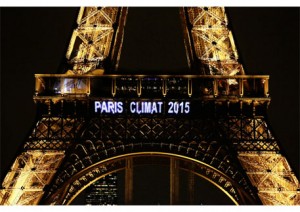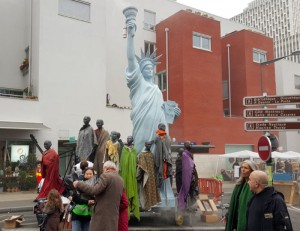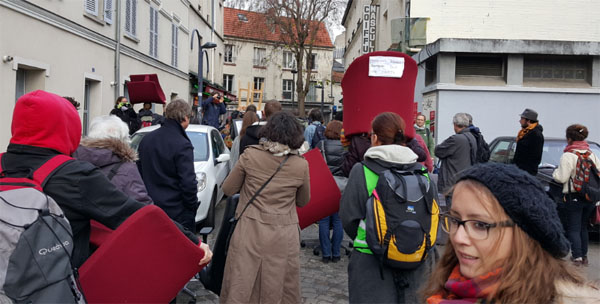NATIONAL
In climate deal, banks must be accountable to civil society
 Jeff Johnson, President of the Washington State Labor Council, AFL-CIO, is part of the labor delegation attending the Paris Climate Conference, advocating for policies that aggressively address climate change while providing for a “Just Transition” that invests in the communities and working families that will be hardest hit by the transition away from a fossil fuel-based economy.
Jeff Johnson, President of the Washington State Labor Council, AFL-CIO, is part of the labor delegation attending the Paris Climate Conference, advocating for policies that aggressively address climate change while providing for a “Just Transition” that invests in the communities and working families that will be hardest hit by the transition away from a fossil fuel-based economy.
By JEFF JOHNSON
Special to The Stand
PARIS (Dec. 7, 2015) — I arrived in Paris at 7:30 a.m. on Saturday, Dec. 5. After clearing Customs I headed out to the Conference of the Parties to the United Nations Framework Convention on Climate Change (COP 21), in Le Bourget, just north of Paris.
After getting credentialed I met with Mike Williams from the National Blue Green Alliance and representatives of Women’s Environment and Development Organization and Center for International Environmental Law. An agreement had been made between “civil society” groups and organized labor to work together to get Just Transition and human rights language put back into Article 2 paragraph 2 of the document. Though, formally, no country claimed credit for removing the language to the preamble, nonetheless the language had been removed last Thursday.
In the afternoon I joined Brad Markell from the AFL-CIO at a press conference being held by 10 U.S. Senators (Sens. Cardin, Whitehorse, Udall, Franken, Shaheen, Schatz, Booker, Markey, Merkley, and Coons). All 10 Democrats expressed a deep desire to move forward with President Obama’s clean power plant rules and with the U.S. commitment to reducing carbon and GHG emissions. When asked whether the rest of the world could count on the U.S. keeping its commitments after the Kyoto accords, Sen. Ben Cardin (D-Md.) responded, “Look at our record not our rhetoric.”
Although this answer didn’t sit well with most, afterwards the senators seemed willing to lend support to the inclusion of Just Transition and human rights language in the operational portion of the document.
On Sunday, COP 21 was closed so I was able to join the Citizen’s Summit on Climate Change in Montreuil. This forum focused on how to finance the social and ecological transition to a renewable energy economy.
 Speakers from Senegal, India, Philippines, Brazil, France, England and the U.S. were eloquent in describing the macro-level problems we are facing. While this is the 21st climate conference, world emissions have risen 5% since the first conference. The $100 billion per year environmental fund to finance the transition to a renewable energy economy by 2020, promised at the Copenhagen Conference, is not nearly enough to do the job. And multinational banks are funding fossil fuel projects at nine times the level of renewable energy projects.
Speakers from Senegal, India, Philippines, Brazil, France, England and the U.S. were eloquent in describing the macro-level problems we are facing. While this is the 21st climate conference, world emissions have risen 5% since the first conference. The $100 billion per year environmental fund to finance the transition to a renewable energy economy by 2020, promised at the Copenhagen Conference, is not nearly enough to do the job. And multinational banks are funding fossil fuel projects at nine times the level of renewable energy projects.
The speakers also put a vivid face on how the climate crisis is impacting people in the developing countries — the grinding poverty and migration to flee drought and starvation — particularly on women, children and the poor. But they also spoke of a strategy to leapfrog the fossil fuel economy in large parts of Africa and Asia, going directly to a renewable energy economy if we are successful in changing the funding priorities of the banks.
The summit arrived at five conclusions:
1. We must close the tax havens that banks and the rich use to hide the bulk of the world’s money from taxation and begin the transition to funding the real economy and climate solutions.
2. We need to alleviate the burden of debt on public budgets and to end the domination of banks and financial markets over democratically elected governments, including debts claimed from the South.
3. We need a global financial transaction tax, the proceeds of which can be invested in the transition towards a renewable energy economy and eradicating poverty.
4. We need to end fossil fuel subsidies without hurting the poor, divest from fossil fuels, and free up resources to invest in renewable energy.
5. We need to make banks accountable to civil society and the public. The problem is not a shortage of money but rather investment priorities that favor the continual burning up of our planet.

The Citizen’s Summit was followed by the 196 Chairs Summit. That number of chairs have been “taken hostage” from branch banks of BNP, France’s largest multi-national bank, over the past month. The chairs are being held hostage until BNP closes its seven subsidiaries in the Caymen Islands and it’s 170 subsidiaries world-wide that serve as tax havens.
 Participants of the Citizen’s Summit carried these chairs from the Town Hall in Montreuil to a public square (about one kilometer) where about 1,000 people cheered on the reading of the conclusions from the morning’s summit. A Basque welcoming dance kicked off the ceremony and a popular French singer ended the program. I did carry a chair and every muscle in this old body can feel it tonight.
Participants of the Citizen’s Summit carried these chairs from the Town Hall in Montreuil to a public square (about one kilometer) where about 1,000 people cheered on the reading of the conclusions from the morning’s summit. A Basque welcoming dance kicked off the ceremony and a popular French singer ended the program. I did carry a chair and every muscle in this old body can feel it tonight.
Tomorrow begins with a briefing from the International Trade Union Confederation, a Blue Green press conference at which I will speak, and a talk in the evening by Naomi Klein and Jeremy Corbyn.
Jeff Johnson is President of the Washington State Labor Council, AFL-CIO, the largest labor organization in the Evergreen State, representing the interests of more than 500 local unions and 400,000 rank-and-file union members.
ALSO see the 2015 Washington State Labor Council resolution on ”Climate and Jobs” approved by delegates representing unions from across the state.





